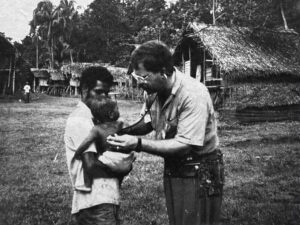 Tropical diseases are more than just a remote concern. With climate change, global travel and increasing populations in urban areas, tropical diseases are becoming more prevalent – often appearing in some primary care and emergency department settings.
Tropical diseases are more than just a remote concern. With climate change, global travel and increasing populations in urban areas, tropical diseases are becoming more prevalent – often appearing in some primary care and emergency department settings.
That’s why Gordon Eggers, PA-C, MPH, DTM (Diploma in Tropical Medicine), a seasoned veteran of tropical medicine, urges PAs to expand their horizons and sharpen their differential diagnostic skillset.
“PAs need to be increasingly aware that tropical diseases may be present in patients they currently care for, or in patients in the near future, as America is a multicultural nation,” Eggers said. “I recommend that if a PA seeks to practice in an international setting, they be formally trained in tropical medicine, the basics of emergency medicine and have some surgical experience.”
Eggers, 72, graduated from the Baylor College of Medicine PA Program in 1976 and holds a Master of Public Health from the University of Illinois.
Last year, Eggers earned a “Diploma in Tropical Medicine” from the “National School of Tropical Medicine,” (NSTM) affiliated with Baylor College of Medicine, Texas Medical Center in Houston.
His extensive overseas experience includes setting up emergency medical services in the American Samoan Islands, battling deadly diseases in civil war-torn South Sudan, Africa, and providing much-needed medical care in remote Papua New Guinea villages, in the southwestern Pacific.
“I developed a deep passion for tropical medicine and caring for people with limited resources,” he said.
His work extended to the Democratic Republic of the Congo, (formerly Zaire) providing medical assistance in the remote village of Banana on the Congo River and even a brief summer contract in rural Kazakhstan, where he trained Russian doctors.
Throughout his PA career, Eggers navigated challenging environments and was exposed to a range of conditions from malaria, dengue fever and typhoid fever to civil war injuries, malnourishment, snake bites, rabies and intestinal worm infections.
“I also saw the importance of immunizations and clean water,” Eggers said.
Recognized with the “PAragon Award” for service to the underserved by the American Academy of Physician Associates in 2007, Eggers returned to the U.S. and practiced as a PA in rural Colorado, and then at a large northern Illinois Federal Qualified Healthcare Center (FQHC), eventually rising to their President and CEO – where he served for 12 years before retiring at age 70.
Even amidst these administrative responsibilities, the call of the tropics remained strong.
Recognizing the need for formal training, Eggers enrolled in the NSTM that provided valuable instruction with an emphasis on Neglected Tropical Diseases (NTD). The World Health Organization defines 41 different tropical diseases, of which 20 are classified as neglected tropical diseases.
The in-depth NSTM program also features practical lab experiences and is designed to prepare graduates for the Certification of Knowledge in Clinical Tropical Medicine and Travelers Health (CTropMed).
Eggers encourages more PA programs to proactively incorporate tropical medicine coursework or electives in their curriculum to prepare future PAs, recognizing the changing world and the importance of the basics of tropical medicine.
“Such patients need dedicated and well-trained PAs to care for them,” Eggers said. “With our training, PAs are equipped to provide leading-edge clinical services for the diagnosis and treatment of tropical diseases.”
Eggers has no plans to slow down anytime soon. He intends to launch an online elective course called “Tropical Medicine and Village Health Care for the Bottom Billion.” He is also seeking opportunities with FQHCs that serve refugees and migrants.
“Overseas work is my sweet spot,” Eggers said, “but I’ve promised my family to avoid ‘conflict zones,’ despite my natural inclination towards them.”

